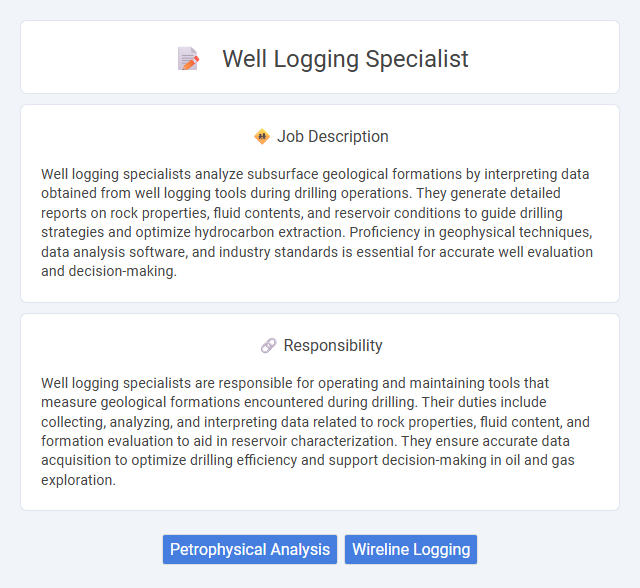
Well logging specialists analyze subsurface geological formations by interpreting data obtained from well logging tools during drilling operations. They generate detailed reports on rock properties, fluid contents, and reservoir conditions to guide drilling strategies and optimize hydrocarbon extraction. Proficiency in geophysical techniques, data analysis software, and industry standards is essential for accurate well evaluation and decision-making.
Individuals with strong analytical skills and an interest in geology or engineering may be well-suited for a well logging specialist role, as the job often requires interpreting complex data to assess subsurface formations. Those comfortable with technology and working in potentially remote or challenging field environments may have a higher probability of thriving in this position. Physical stamina and the ability to remain focused under pressure could also influence suitability for the demanding conditions typically encountered during well logging operations.
Qualification
A well logging specialist requires a strong educational background in petroleum engineering, geoscience, or related fields, typically holding a bachelor's degree or higher. Proficiency in interpreting geological and petrophysical data using advanced logging tools and software is essential. Certification in well logging techniques and experience with data analysis in drilling operations enhance a specialist's qualifications and employability.
Responsibility
Well logging specialists are responsible for operating and maintaining tools that measure geological formations encountered during drilling. Their duties include collecting, analyzing, and interpreting data related to rock properties, fluid content, and formation evaluation to aid in reservoir characterization. They ensure accurate data acquisition to optimize drilling efficiency and support decision-making in oil and gas exploration.
Benefit
A Well Logging Specialist likely contributes significant value by providing detailed subsurface data essential for accurate reservoir evaluation and decision-making. Their expertise probably enhances drilling efficiency and reduces operational risks through precise interpretation of logging measurements. This role may offer considerable financial and professional growth opportunities due to the high demand for skilled specialists in the oil and gas industry.
Challenge
A Well Logging Specialist likely faces significant challenges in accurately interpreting complex subsurface data to inform drilling decisions. The role probably requires advanced analytical skills and proficiency with specialized logging tools and software to mitigate the risks of erroneous readings. Challenges may also include working in harsh field conditions and adapting to rapidly changing geological scenarios.
Career Advancement
A Well Logging Specialist analyzes subsurface formations using advanced logging tools, providing critical data for oil and gas exploration. Mastery of geophysical logging techniques and data interpretation enhances opportunities for roles such as Senior Logging Engineer or Reservoir Evaluation Specialist. Continuous skill development in technology and software applications significantly accelerates career advancement in this specialized field.
Key Terms
Petrophysical Analysis
A Well Logging Specialist conducts detailed petrophysical analysis by interpreting subsurface geological formations through well log data. They utilize advanced tools such as gamma ray, resistivity, and neutron logs to evaluate rock properties, porosity, and fluid saturation, critical for optimizing hydrocarbon extraction. Expertise in petrophysical software enhances accuracy in reservoir characterization, enabling efficient decision-making in exploration and production.
Wireline Logging
A well logging specialist in wireline logging operates sophisticated tools lowered into boreholes to collect detailed geological and petrophysical data critical for reservoir evaluation and drilling decisions. Expertise in handling measurement-while-drilling (MWD) and formation evaluation tools allows accurate assessment of rock properties, fluid content, and formation boundaries. Mastery of data acquisition, interpretation software, and adherence to safety protocols ensures optimized well placement and enhanced hydrocarbon recovery.
 kuljobs.com
kuljobs.com